I have been trying to figure out the chronology of events that led to the establishment in 1896 of the Quốc học, a school in the Nguyễn Dynasty capital of Huế that was dedicated to teaching French to the children of the royal family and Nguyễn Dynasty officials.
From what I have been able to determine so far, it was French governor-general Paul Armand Rousseau’s idea. Rousseau then consulted with the French resident-superior in Huế, Ernest Albert Brière, who in turn discussed the matter with members of the Nguyễn Dynasty Privy Council (Viện Cơ mật 機密院).
In bringing up this matter, Rousseau and Brière indicated that they had someone in mind to serve as the director of the Quôc học, a man by the name of Ngô Đình Khả.
Ngô Đình Khả’s sons, and one of them in particular, played very important roles in twentieth-century Vietnamese history, but I have never seen much information about Ngô Đình Khả. So in coming across his name, I decided to try to figure out what I could about his life during this period.

In looking around through the digitized sources on the website of the National Library of France, I can see that in 1886 Ngô Đình Khả was hired to work as an interpreter at the Résidence supérieure in Huế.
This is right when the French were formally establishing a protectorate over the center and north of Vietnam (Annam and Tonkin), the areas of Vietnam that were still under the control of the Nguyễn Dynasty (the south having earlier been ceded to France), and when the French had just ended a war that forced the Qing Dynasty to relinquish its claim of sovereignty over Vietnam.
The following information was noted in the Moniteur du protectorat de l’Annam et du Tonkin:
“By decision of the Resident General, dated May 15, the Annamite Ngo-dinh-kha was appointed interpreter at the salary of 1,500 francs, to serve at the Résidence supérieure of Hue, from where he will be temporarily assigned to serve Mr. Dillon, chairman of the commission to delimit the frontier [boundaries].”

The Bulletin officiel de l’Annam et du Tonkin then has an entry from early 1891 indicating that Ngô Đình Khả was promoted from an interpreter of the third class to the second class.
And a year later he was promoted yet again to the level of first-class interpreter.
So things seemed to have been going well for Ngô Đình Khả at the Résidence supérieure. Then in 1895 something happened.
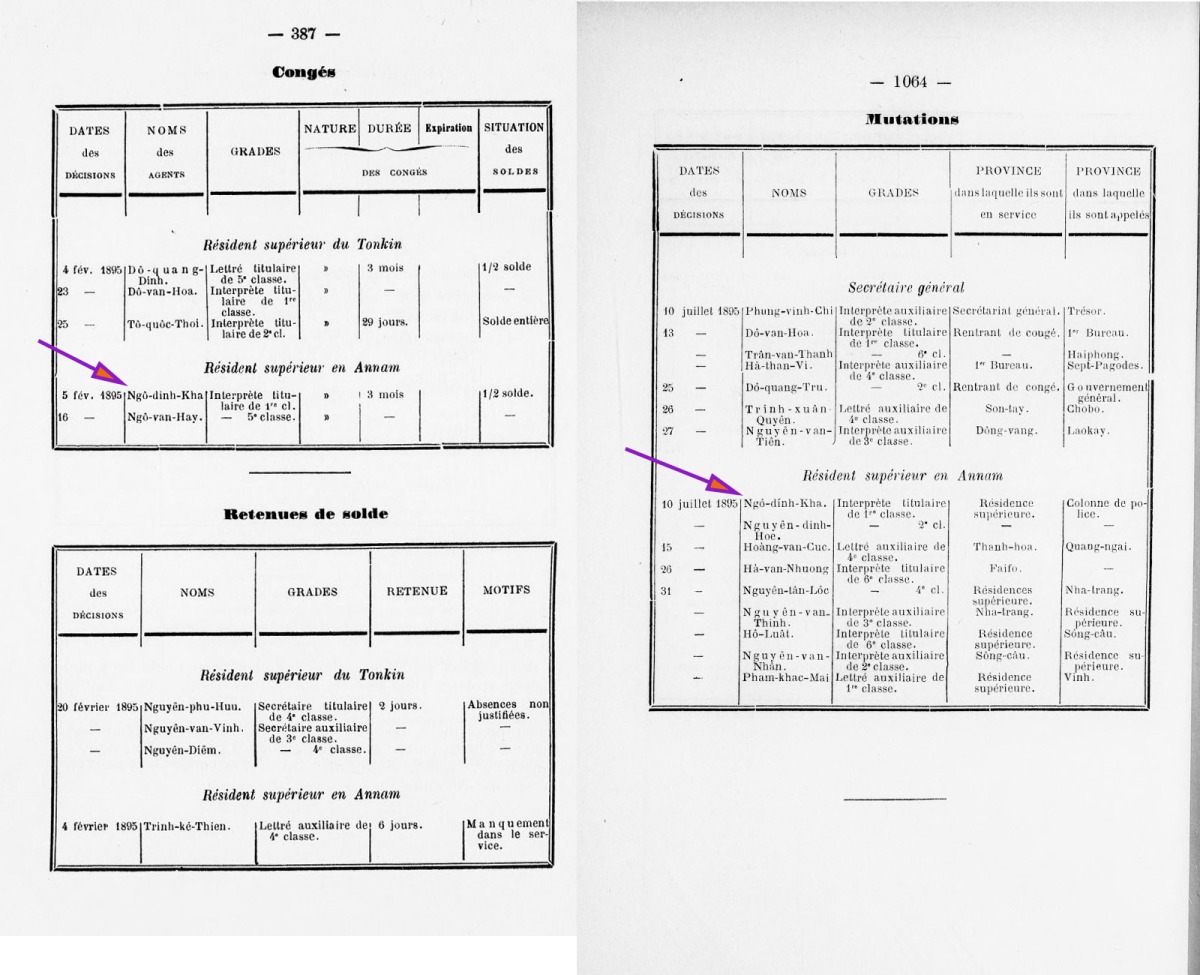
The February issue of the Bulletin officiel de l’Annam et du Tonkin indicates that Ngô Đình Khả went on leave for three months. Then the July issue indicates that he was transferred from the Résidence supérieure to the “colonne de police.” As I understand it, this was either another name for, or a unit under, the Garde indigene, an internal security force made up of Vietnamese with French officers.
So was moving from the Résidence supérieure to the colonne de police a promotion or a demotion? And what was that 3-month leave all about?
On the one hand, it looks like something might have gone wrong and Ngô Đình Khả had to leave the Résidence supérieure for a while, before being demoted to a position in the colonne de police.
On the other hand, perhaps there was some very important special mission that the colonne de police needed Ngô Đình Khả for (??).

Whatever the case may be, the following year, in 1896, we see that French officials wanted Ngô Đình Khả to serve as director of a new school in Huế for teaching French, the Quóc học.
Further, the documents about this offer some more interesting information about Ngô Đình Khả.
There are three documents related to the establishment of the Quốc học (and there are versions for each in both Hán and French): an edict (ordonnance Royal) from Emperor Thành Thái (who was only 17 at the time so ultimately the document came from a group of regents who were overseeing the government, but for the sake of simplicity I will just use the emperor’s name) approving the establishment of the school; an order (arrêté) approved by Emperor Thành Thái that was sent to officials across the realm to inform them of the details about this new school; and an order (arrêté) approved by Emperor Thành Thái that officially appointed Ngô Đình Khả as the director of the Quốc học.
It is clear that the edict was drafted first, followed later by the other two documents, and in these later documents Ngô Đình Khả is referred to differently than he is in the earlier edict.
In the later two documents, Ngô Đình Khả is referred to as Chief Minister of the Court of Imperial Sacrifices (Thái thường tự khanh 太常寺卿), a high-ranking position.
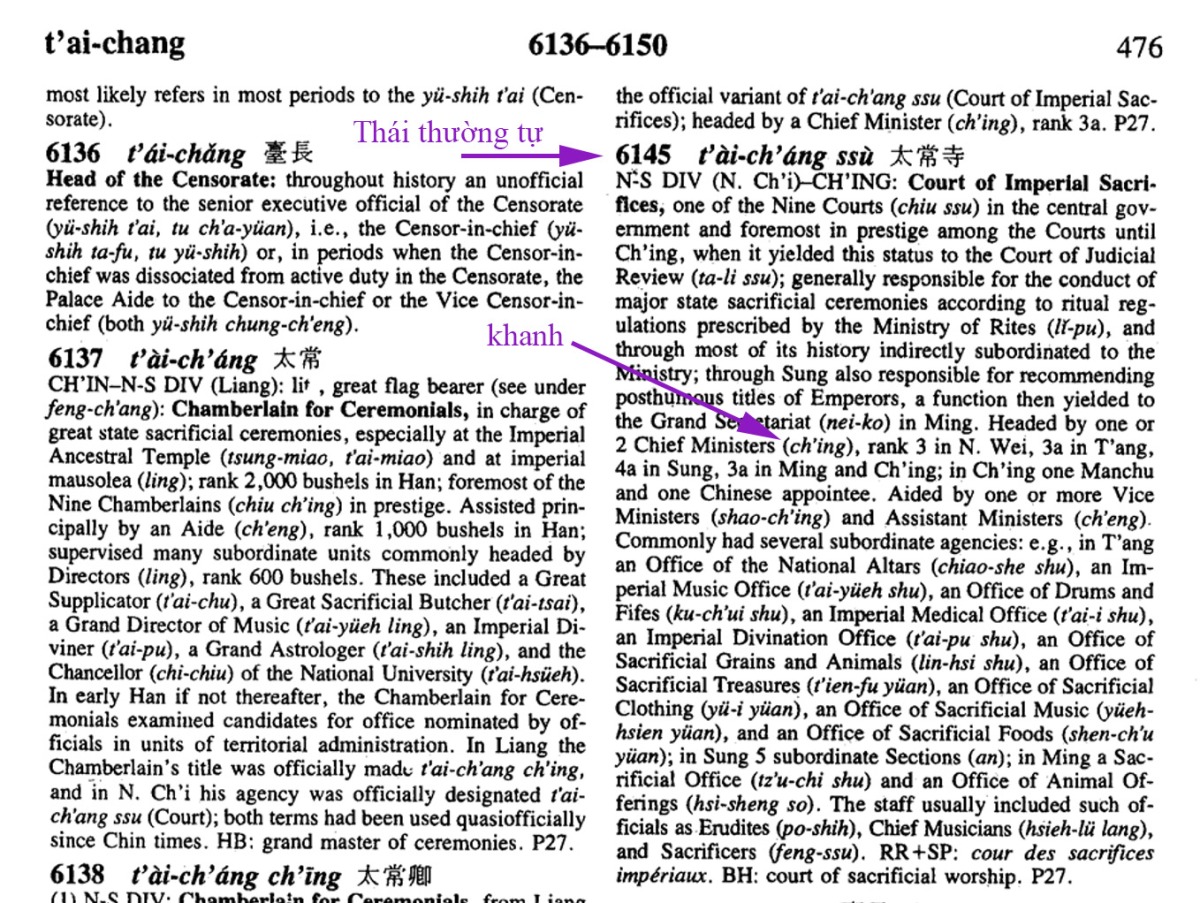
In the earlier edict, however, Ngô Đình Khả is referred to as a “thương tá” 商佐 in the Hán text and as a “thuong bien” in the French version.
What are these? Whenever I come across a title written in Hán, I always check Charles O. Hucker’s A Dictionary of Official Titles in Imperial China. Yes, sometimes Vietnamese titles were different from Chinese titles, but usually you can find some connection to a Chinese title. In this case, however, Hucker has nothing like these titles there, which suggests to me that they were new terms.
What do they mean? The Hán characters mean something like “discussion assistant,” and in the edict the exact same title is given to a French official whose title in French is “chef de bureau.” The term “thuong bien” in the French version is written without diacritic marks, so one can’t be 100% certain what it means.
However, I did find that it was used in at least one Nguyễn Dynasty office at that time. To understand what that position was for, however, requires a bit of explanation.
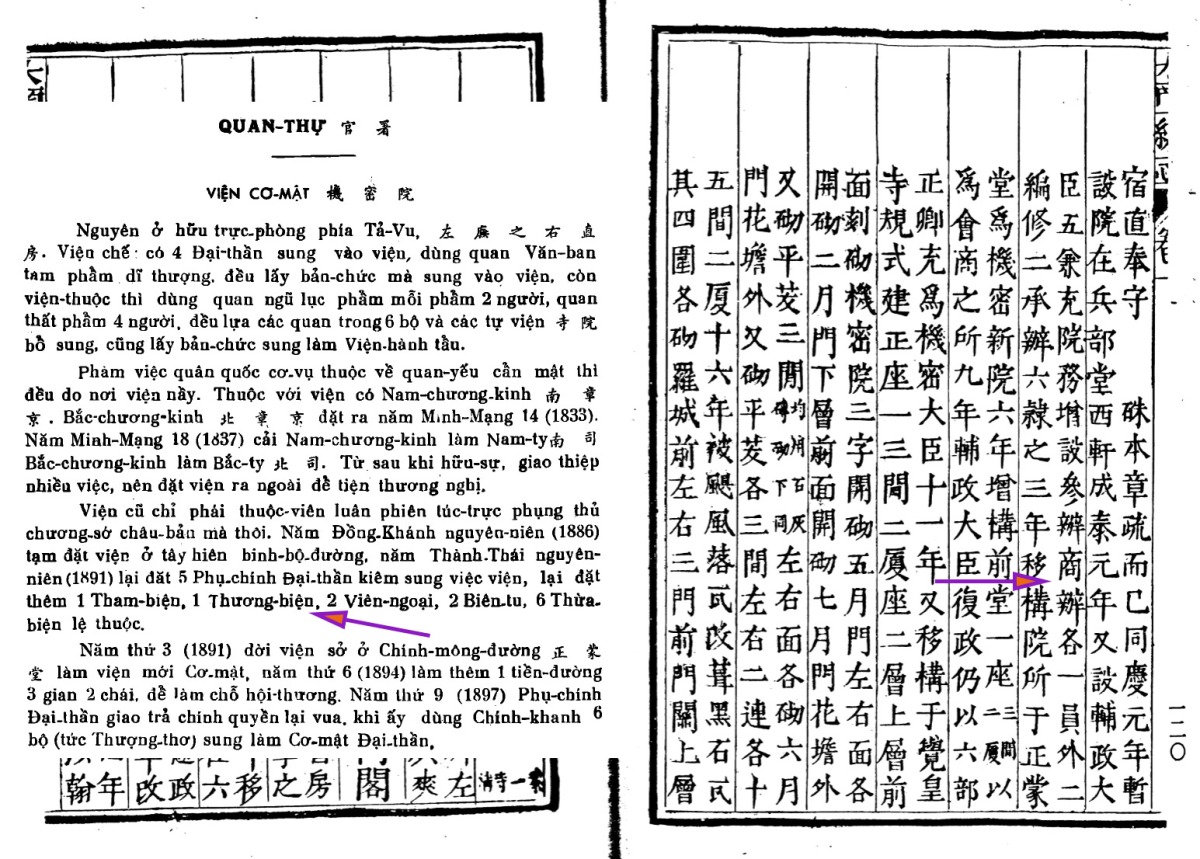
In 1834 Emperor Minh Mạng established an office known as the Privy Council (Viện Cơ mật 機密院). This was a kind of “special office” where Emperor Minh Mạng met with certain top officials to discuss important matters.
This office continued to exist under later emperors, however, when Emperor Thành Thái came to power in 1889 a new office was created that took away some of the power of the Privy Council. This office was known as the “Assisting Government” (Phụ chính phủ 輔政府), and its purpose was to “assist” Emperor Thành Thái who was at that time still young (It was discontinued in 1897, but then formed again at the beginning of the reigns of emperors Duy Tân and Bảo Đại, respectively).
The “Assisting Government” was led by some chief ministers (đại thần 大臣; i.e., “regents” in this case), and they were assisted by some minor officials, one of which was called a “thương biện” 商辦.
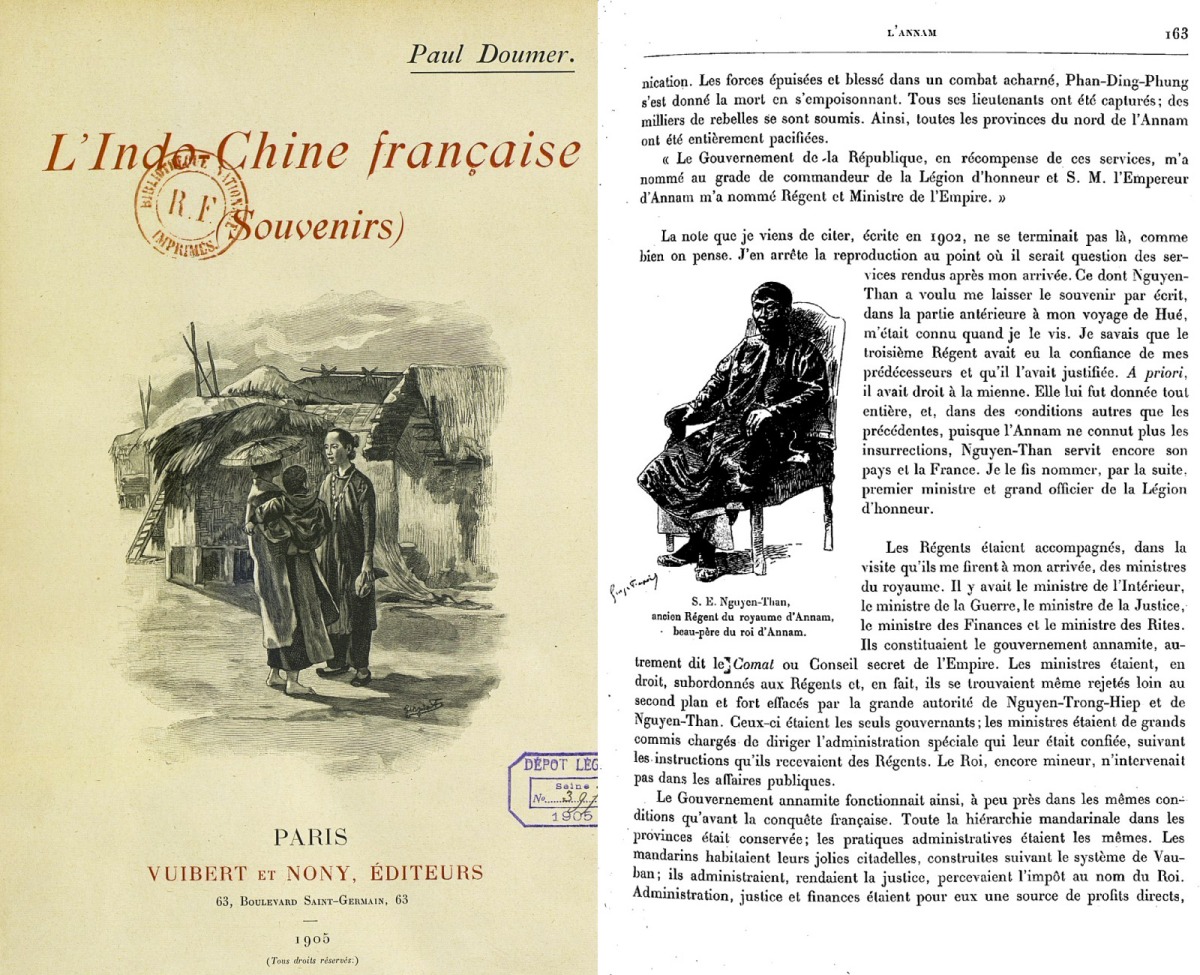
What does “thương biện” mean? It literally can mean something like “discussion handler” or “a person who carries out discussions.” I’m guessing, however, that this term was probably a new term that was created to translate the French term “interpreter,” and that in this new “Assisting Government” that was set up to “assist” the young Emperor Thành Thái there was probably an interpreter who helped the “Assisting Government” communicate with the French Resident Superior (whereas Ngô Đình Khả was on the other side helping the Resident Superior).
This ties in with the point that I brought up in the previous post about how this was a time of change from a world focused on writing (in classical Chinese) to a world that relied on speaking (in French). Prior to the arrival of the French, the Nguyễn Dynasty did not have a serious need for people who interpreted languages, as most of their important “foreign relations” took place through writing.
Indeed, the “Assisting Government” worked closely with the French authorities. It was essentially the “French connection” to the Nguyễn Dynasty, and it would therefore make sense that it would have an interpreter.

So if a “thương biện” was an interpreter, this would explain why in the French version of Thành Thái’s edict approving the establishment of the Quốc học that Ngô Đình Khả was referred to as a “thuong bien,” as he had spent the previous 10 years working for the French as an interpreter, and people in the government must have known him very well.
Why was he referred to as a “thương tá” in the Hán version? Again, to make a long story short, the Hán text we have today was printed much later (during Emperor Bảo Đại’s reign), and was printed from woodblocks.
My guess would be that a sleepy woodblock carver made a mistake and carved “thương tá” 商佐 instead of “thương biện” 商辦. At the top of the same line he carved “thương tá” (the Hán version of the French title “chef de bureau”) and then at the end of the line he mistakenly wrote the same title again instead of the term for “interpreter” (just a difference of the second character). Stuff like this happened a lot.
The more important question is why was Ngô Đình Khả referred to as a “thương biện,” or interpreter in the French version of Emperor Thành Thái’s edict approving the creation of the Quốc học (which was printed at the time in 1896), but then in subsequent documents (which must have been drafted in the following days or weeks), both French and Hán, as Thái thường tự khanh (Chief Minister of the Court of Imperial Sacrifices)?
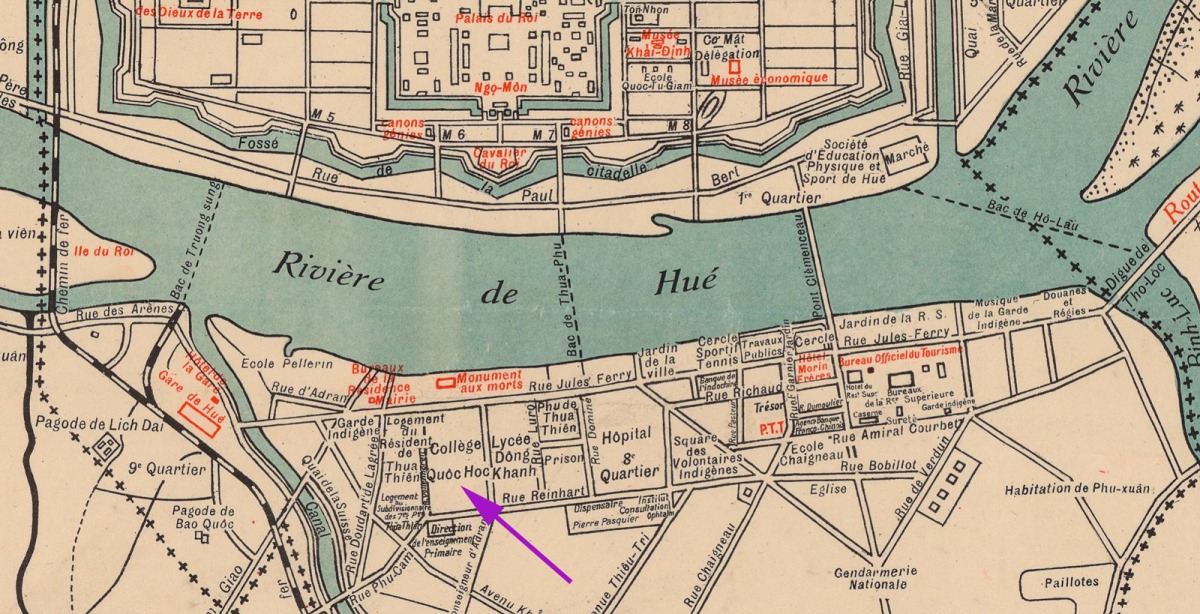
Here is my theory:
- Ngô Đình Khả was hired to work as an interpreter at the Résidence supérieure in Huế in 1886.
- In 1891 he was promoted.
- In 1892 he was promoted again.
- In 1895 for some reason Ngô Đình Khả was transferred to the “colonne de police.”
- In 1896, Governor-general Rousseau talked with Resident-superior Brière about setting up a school to teach French at the Nguyễn Dynasty capital of Huế. Brière suggested that Ngô Đình Khả direct it, either because A) he wanted to thank Ngô Đình Khả for a job well done in working on some special assignment for the “colonne de police,” or B) because the work with the “colonne de police” was a demotion that Brière felt Ngô Đình Khả didn’t deserve and wanted to make things better for him.
- Rousseau and Brière (or it could have been Brière on behalf of Rousseau) talked with the Privy Council (some members of which were also members of the “Assisting Government”) and told them that they needed to create the Quôc học.
- The Privy Council got Emperor Thành Thái’s approval (ultimately this means that the “Assisting Government” approved it), and an edict was drafted which mentioned the “thương biện” Ngô Đình Khả.
- In the days that follow, as French officials and members of the Privy Council worked out the details, someone realized that “thương biện” is too low of a position for someone to run a government agency. So “thương biện” Ngô Đình Khả got promoted to Thái thường tự khanh (Chief Minister of the Court of Imperial Sacrifices), and this is the title that was mentioned in the subsequent two documents.

Again, this is guesswork, but the peculiarity of the terms that this guesswork is based on convinces me that I’m probably on the right track. . .
In any case, there’s no question but that the Quốc học played an important role in Ngô Đình Khả’s rise to prominence. Again, thanks to the digitization efforts of the National Library of France, we can also see (in the image above) that in 1902 Ngô Đình Khả was granted 77 “ares” of land right next to the Quôc học.
One “are” was 100 square meters (100 m2). So 77 “ares” in the center of Huế, the imperial capital, right across the river from the citadel. . .
Ngô Đình Khả had made it to the top.


This Post Has 12 Comments
This is really interesting, Professor, nice work! The first thing that occurred to me while reading your post is that, as far as I’m aware, no one has ever written a history of the Quôc học (not in English or French, anyway). Given the enormous influence which students of that lycée have had on the modern history of Việt Nam, that is a fairly important omission…
In reference to the part where you said ‘What does “thương biện” mean? It literally can mean something like “discussion handler” or “a person who carries out discussions.”’- could it be possible that “thương biện” means “negotiator”?
To make a long story short, the place where I found that term listed was in reference to an office, where it listed the important officials first, and then this term (thuong bien) came later. So that signifies that it was a position of secondary importance, someone who aided the big guys. From that information alone, “negotiator” is a bit too important for it looks like that person must have been. That said, in reality if there was one person who knew French and did all the talking when the officials from this office had to interact with French officials, then yea, in that sense the person probably was a de facto negotiator, but the official position was more lowly – interpreter.
In any case, the documents that Saigon Buffalo shared make it clear to me that “thuong bien” was a that was created to refer to an “interprète.”
The “colonne de police” in which Ngô Đình Khả participated seemed to be the counter-insurgency campaign the Nguyễn Dynasty official Nguyễn Thân conducted against the Cần Vương movement led by Phan Đình Phùng. Appointed “Khâm Mạng Tiết Chế Quân Vụ Đại Đại Thần”, Thân managed to crush Cần Vương partisans under Phùng’s leadership in a way that has led the French historian Charles Fourniau to compare his tactics to those Americans would later apply in the Phoenix Program.
I happen to possess photographs of three documents from the French archive, which establish Ngô Đình Khả’s participation in that campaign, and which can be consulted
via this link:
https://www.flickr.com/photos/168630084@N05/
1/ the letter which Brière nominated Ngô Đình Khả to become the Director of the Quốc Học school,
2/ the report on the situation in Annam by the same Brière (see Colonne4)
and
3/ the letter that Ngô Đình Khả’s son, Bishop Ngô Đình Thục, wrote to Governor-General Jean Decoux in August 1944.
Those documents were unearthed and referenced in published works by the Vietnamese-American historian Vũ Ngự Chiêu quite a long time ago. So, when I was in France, I could just drop by the institution that preserves them to take the photographs aforementioned 🙂
Wow!! Thank you Thank you Thank you for sharing this!!!!!!!
Yea, I was thinking of Ham Nghi and De Tham, neither of which fit in terms of the timing. How could I have forgotten Phan Dinh Phung?!!
Yes, all the links are tied together here now.
Brière nominated “interprète principal” Ngô Đình Khả to serve as the director of the Quốc học.
We see in his other document that “thương-biện” (clearly the term at that time for “interpreter”) Ngô Đình Khả served “Khâm-Mạng” in upper Quảng Bình in the effort to capture Phan Đình.
[thương-biện Ngô Đình Khả, délégué du Khâm-Mạng dans le haut Quảng Bình.]
Khâm-Mạng 欽命 means “Imperially commissioned,” and is the beginning of the title you list here that was held by Nguyễn Thân. Nguyễn Thân was also, I believe, the primary regent in the “Assisting Government” that was calling the shots in Huế. So that means that he was essentially “imperially commissioned” by himself. . .
And as Brière notes in his letter proposing that Ngô Đình Khả direct the Quốc học, Nguyễn Thân apparently wanted Ngô Đình Khả to work for him, and for his services Ngô Đình Khả was granted the title of Thái thường tự khanh.
“His Excellency the Khâm-Mạng had asked him to attend/accompany/participate in the police column, and the services rendered on that occasion earned him from the court the rank of Thái-thường-tự-Khanh (the Mandarin of 3rd degree, 1st Class).”
S. E. le Khâm-mạng l’avait demandé pour l’assister à la colonne de police, et les services rendus à cette occasion lui ont valu de la Cour le grade de Thái-thường-tự-Khanh (l’mandarin de 3e degré, 1ère classe).
Wow wow wow!!! Did we just rewrite history here? I certainly have learned a lot and have a very new perspective on Ngô Đình Khả and the Quốc học. So interesting!!!!
Thank you again for sharing those documents!!! In my head I was wondering what exists in French archives, and voilà!!
In the Quốc Học dossier that Vũ Ngự Chiêu has uncovered and rendered public, there are two documents which indicate that Ngô Đình Khả did not eventually become the director of the Quốc Học school. He was appointed its “sous-directeur”, the post of “directeur” being assigned to a French scholar by the name of Edmond Nordemann, who, among other things, had published a French translation of “Cung Oán Ngâm Khúc”.
Two official decisions by the colonial government, which the Bibliothèque nationale de France has digitalized, appear to confirm the point raised in those documents.
Since it is Friday, I have time to put all of them online:
https://www.flickr.com/photos/168630084@N05/
The French translation of “Cung Oán Ngâm Khúc” published by Nordemann is already available online:
https://books.google.com/books?id=dNgZAAAAIAAJ&pg=PP7&lpg=PP7&dq=edmond+nordemann+%22cung+oan+ngam+khuc%22&source=bl&ots=a4mKRJNLjq&sig=ACfU3U3xPXYls5w8PnYhyInHCkOchtWBcg&hl=en&sa=X&ved=2ahUKEwiqlquN5-HgAhVOC6wKHbnXDd0Q6AEwA3oECAcQAQ#v=onepage&q=edmond%20nordemann%20%22cung%20oan%20ngam%20khuc%22&f=false
Thanks for sharing these!! I’m a bit swamped at the moment, but I’ll get back to this soon.
Thanks again!!!
́́Ngô dinh Khả was no unknown person . If one searches his name in Vietnamese Internet , one finds numerous facts about him :
_ his father Ngô dinh Dinh was a ” boat people ” called “vạn ( fisherman ) đò ( boat ) ” , river fishermen living on their boats on riverbanks , of course very poor . He became the first convert of the family , a “rice Christian ”
http://lexuannhuan.tripod.com/NgoDhKha.html
Sinh năm 1850; quán làng An-Xá, tổng Đại-Phong, huyện Lệ-Thủy, tỉnh Quảng-Bỉnh. Con ông Ngô Đình Dinh. Được một cố đạo nhận làm con nuôi, gửi qua Penang (Hạ Châu) ở Mã Lai Á (Malaysia) học trường nhà dòng. Bỏ tu, đi làm thông-sự cho Pháp, thăng chức Chánh Phòng thông sự ở Dinh Khâm-Sứ tại Huế dưới thời Khâm-Sứ Trung-Kỳ Pierre Paul Rheinart (here interpreter is traduced by thông su )
Tháng 6-1895: Theo Nguyễn Thân đi đánh dẹp tổ-chức “Văn Thân” của Phan Đình Phùng ở vùng Hà-Tĩnh/Nghệ-An.
Tháng 12-1895: Ngự-sử Phan Đình Phùng từ-trần, Ngô Đình Khả cho đào mộ Phan Đình Phùng, đốt xác, trộn tro với thuốc súng mà bắn đi.
Tháng 2-1896: Được phong Thái Thường Tự Khanh (Chánh Tam Phẩm), giữ chức Thương-Biện Viện Cơ-Mật. ( thương-biện seems to be a more exalted post than
interpreter )
Năm 1905: Được cất nhắc lên chức Tổng-Quản Cấm-Thành (Surintendent du Palais) và có ảnh-hưởng lớn với Vua Thành-Thái.
At one moment he was named chief of the royal bodyguards (Thị 侍 vệ衞 ) “Tổng-Quản Cấm-Thành” charged with watching ans spying on the king and court .
One has a document where he was summoned to report on his mission :
[ Trong một cuộc họp tại Tòa Khâm-Sứ Pháp vào lúc 4:15 chiều ngày 14-8-1906, có mời các Thượng-Thư Bộ Lại, Bộ Lễ, Bộ Binh, Bộ Hộ, Bộ Hình, và Bộ Công của triều-đình Việt Nam tham-dự, tài-liệu của Pháp có ghi:
http://lexuannhuan.tripod.com/NgoDhKha.html
“… S.E. le Ministre de l’Intérieur fait renseigner que M. NGO DINH KHA, Chef des Thi Ve chargé de la haute direction du Palais devra être invité et fournir tous renseignements concernant ces personnages qu’il connait mieux que tout autre.]
_ his two elder sons Khôi and Diêm were named mandarins not on their merits but thanks to the ” ấm sinh 廕生” rule ( sons of meritorious officials ) . They were both known for their cruel and unforgiving repression of any anti French dissent .
_ ND Khôi was murdered in August 1945 after the Japanese surrender , alongside with his son ND Huân and the notorious collaborator Pham Quynh , by the Viet Minh ; a squad of French officers led by a colonel named Castella were taken prisoners in the outskirts od Huê , they had an order of mission from de Gaulle to take contact with ND Khôi and Pham Q. ; so to prevent the French take over , they were disposed of .
http://tuanbaovannghetphcm.vn/bat-gon-va-tieu-diet-mot-phai-doan-quan-su-cua-tuong-de-gaulle-do-castella-chi-huy-nhay-xuong-co-do-hue-8-1945/
_ Ngô dinh Huân was missioned by his famiily to learn Japanese ; at first , he was the interpreter of the director of the Japanese Saigon cultural center; then secretary of the Japansese consul Yokoyama in Huê ; the Ngô didn’t put their eggs in the same basket .
All of that added , the Ngô family has been reviled by the Communist side as ”
“tam đại Việt gian” , three – generation traitors to the VN cause
Retrospectively , for the family , it has been a meteoric rise to the top within 2 generations , from ” boat people ” to head of a state then precipitous fall in the abyss ( the Tarpeian rock is close to the Capitole )
Thanks for the information!
Yes, I know that Ngo Dinh Kha was not unknown, and yes there is information about him on the Internet. What is lacking, however, is “documented” information. Historians have to base their ideas on things that they can actually document. That letter from 1944 is helpful, but it comes some 50 years after the time we’re looking at here. People can remember things differently after 50 years, so sources like that ideally need to be checked against sources from the actual time period. That is what has been lacking, as far as I’ve seen. So that is why these materials from the 1890s are helpful.
Apparently , it comes out that ” thương biện ” does not mean interpreter ; thương biện is probably a mid or upper level mandarin . Interpreter then in the 1900s was translated by thông sự ( thông ngôn , in south VN in the 1960s and 70s ; I don’t know how it was called in north VN ) . Interpreters were no mandarins , while ND Khả was a ” chánh tam phẩm Thương biện ” of the Inner Cabinet ( Viện Cơ-Mật ) . He certainly was not well versed in văn ngôn as should be high – level mandarins ; as the saying goes , in troubled times , strange things or beings come to be born .
And most certainly , he was no resistance fighter against colonial rule
Two feats were claimed for his benefit :
_ first , the founding of the Quốc học School was attributed to him and dressed up as a patriotic endeavour for the training of future independance cadres ; in reality , the school was founded by the French to train interpreters for their sake and he was only the sous director .
_ his other ” resistance ” feat was his non – approval of Thành Thai ‘s demise .
What were his motivations are still unexplained but certainly they were not patriotic .
As a wildest guess , he must have been a high level Secret Service for Indochina agent , supposedly the VN deputy of the French director . That would explain his and his son Diêm ‘s meteoric rise .
There is a similarity with the Bush family , Bush Sr was CIA ‘s head before he became Vice , then president ; Bush Jr is the equivalent of Diêm , both seen as bumbling characters . In the last US house of Representatives mid term elections , many Democratic candidates who got elected were former intelligence agents .
_ I recently search for thương biện 辦 in the Từ điển Hán Nôm and found no entry ; but I found tham biện 參辦 = chức vụ tại công sở thời Pháp thuộc
In my opinion , ” thương biện ” does not exist , contrariwise , there are officials as
tham biện or tham tá 參佐
_ errata : vạn = fishermen ‘s village ; đó = fish trap
This time period of the late nineteenth and early twentieth centuries is one in which a lot of terms relating to Western and Western concepts appeared in Chinese that were abandoned by the 1920s as other terms became standardized. What is more, such terms often did not make it into dictionaries. “thương biện” literally means to discuss and carry out. It seems to be a translation of a Western term. As for what that person actually did, that’s not clear, but interpretation could have been part of it.
Dear Riroriro, I didn’t know much about my father who died during the Franco VN war around 1946 when I was 7 years old. My father was better known as “ông tham” (Mr Tham), say, tham is short of tham tá; he bore the title which went in French as commis de commerce, tham biện / tham tá thương mãi. When Quốc Tử Giám (with classical Chinese studies) was closed, he went to Hanoi to attend the commerce school, a kind of higher education along with law school, medical school. .. I wonder whether my dad became a commis as a degree or as a ranking civilian servant based on his studies in Hanoi. He worked for a short time for Chemin de Fer (Rail Road Service) before becoming a private entrepreneur. But he had been all the time tham tá / tham biên thương mãi. In short, “ông tham”, Mr Commis that was him.